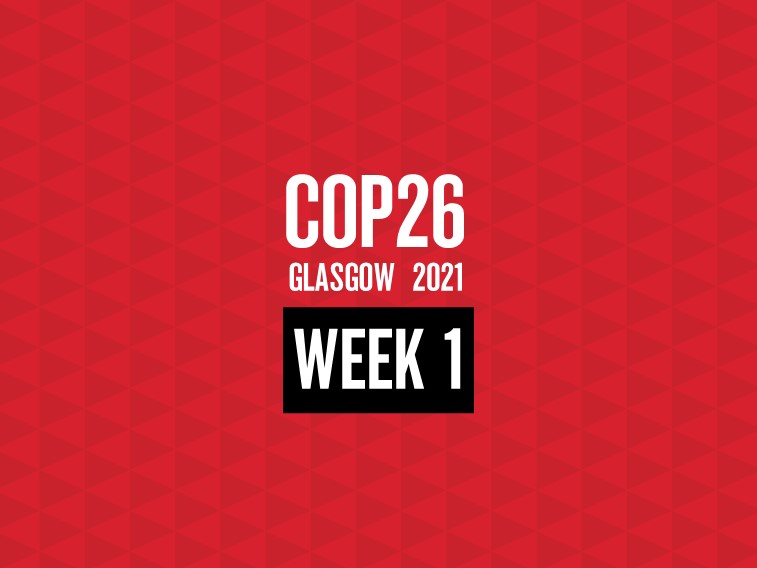Confidence and Conditions Lift


Insight
While the world’s press and pundits assess the ongoing talks in Glasgow, we look at what’s happened so far and what to expect during this crucial time for climate action.

After a wobbly start at the G20 in Rome, where divisions between major economies underscored geopolitical tensions for the international climate project, world leaders this week finally converged on the “last-chance saloon” in Glasgow to make some real progress at COP26.
A week in, with strong themes of finance and carbon reduction amid an array of commitments, there is cautious optimism among observers that this year will be a catalyst for change, with genuine momentum and action to build on the 2015 Paris Agreement.
While net zero 2050 remains a moving target for some notable big emitters, with “mid-century” instead accommodating goals of 2060 and 2070, major pledges so far suggest the world is steadily moving along its path to a low carbon future, with warming to be held below 2 degrees Celsius this century if promises are kept.
At stake are environmental actions affecting the everyday lives of billions around the globe, with coal, electric vehicles and deforestation featuring in the spotlight as well as ways to support vulnerable nations to mitigate and adapt with climate finance.
The opportunity for channelling further capital into net zero was the main focus of the key finance day this week, where global leaders in the field came together to explore how to mobilise public and private investment for rapid, large-scale climate action and adaptation.
Of the major announcements, led by former Bank of England governor Mark Carney, more than $US130 trillion of private finance is now aligned to science-based net zero targets by 2050, plus high ambition earlier goals, through the Glasgow Financial Alliance for Net Zero. The commitment includes a coalition of more than 450 firms across 45 countries, spanning the entire financial spectrum.
A new global standards body, the International Sustainability Standards Board (ISSB), was also announced to rapidly build on existing frameworks for climate reporting. It promises to elevate sustainability to the same status as financial reporting, sitting alongside the International Accounting Standards Board (IASB).
Into this environment of greater disclosure, the Reserve Bank of Australia and prudential regulator APRA also this week committed to monitoring climate impacts on the financial system.
Glasgow’s energy day on Thursday which sharpened focus on the transition from fossil fuels saw more than 40 countries commit to move away from coal. This follows the earlier vow from more than 100 nations at the opening World Leaders’ Summit to cut methane emissions by 30 per cent by 2030 in what EU President Ursula von der Leyen called “the lowest hanging fruit”.
Australia is among nations declining both these agreements, with the government focusing for now on its technology-driven 2050 net zero target across the whole economy rather than commitments on particular emissions.
In other projects, more than 100 countries set out to reverse deforestation by 2030, backed up with $US20 billion in private and public funds to help end logging and protect forests.
Along with these international pledges, host Boris Johnson also welcomed support for his program of “Glasgow breakthroughs” – a series of initiatives to make clean energy “the most affordable, accessible and attractive choice” in each of the world’s most challenging sectors by 2030. The agenda collectively covers more than 50 per cent of global emissions and focuses on decarbonising power, road transport, steel and agriculture while stimulating low carbon hydrogen production through the acceleration of affordable clean technology investment.
Still at issue is the divide between developed and developing nations, with the promised target of $US100 billion a year to help support countries in the transition falling short by $US20 billion. COP26 has seen further global commitments from a range of countries already delivered and more expected in public and private initiatives to come.
Of the bloc comprising China, India, Russia and Brazil, only Indian Prime Minister Narendra Modi was among those in Glasgow there to take the World Leaders podium. Modi pointed to the ongoing global funding gap while setting key target ambitions for 2030 but maintained a longer lead time on net zero.
India’s “five elixirs” for reducing emissions are: net zero by 2070; the generation of 500 gigawatts of power through non-fossil fuels by 2030; reducing carbon intensity of the economy by 45 per cent by 2030; reducing projected carbon emissions by 1 billion tonnes by 2030; 50 per cent of energy from renewables by 2030.
A climate finance deal with France, Germany, the UK, the US and EU was also announced to support South Africa accelerate its emissions reductions with a $US8.5 billion Just Energy Transition in what could be a new paradigm for other countries.
In the local region, Australia is boosting climate finance to our Pacific and southeast Asia neighbours to $A2 billion. It will be administered directly rather than through the UN framework.
Collectively the measures so far unveiled suggest better than expected outcomes from Glasgow as the talks progress. Next week will cover themes of adaptation, innovation, gender equality, transport, cities and the built environment in addressing the transition to net zero globally.
A week ago at the G20, it was long-time environmental supporter Prince Charles who called COP26 “the last-chance saloon” as he urged leaders on and into action as they headed for Glasgow.
Along with bringing his passion for the planet and memorable turn of phrase to the conference, the Prince of Wales this week awarded NAB the Terra Carta Seal through his Sustainable Markets Initiative in recognition of our commitment to creating a sustainable future.
NAB is the only Australian financial institution, and one of only three Australian companies, to receive the 2021 inaugural Terra Carta Seal which recognises global companies driving innovation and demonstrating their commitment to, and momentum towards, the creation of genuinely sustainable markets.
© National Australia Bank Limited. ABN 12 004 044 937 AFSL and Australian Credit Licence 230686.